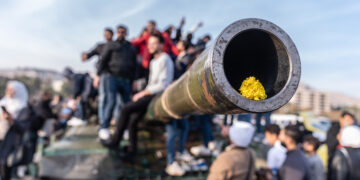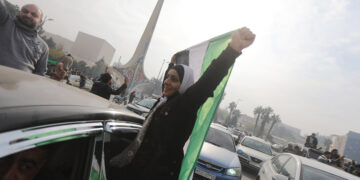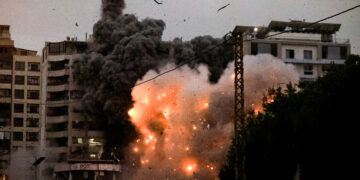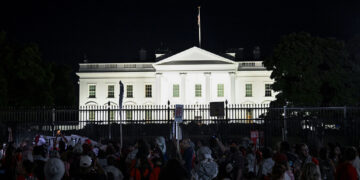The proceedings at this workshop were conducted under Chatham House Rule, meaning that participants were free to use the information received, but neither the identity nor the affiliation of the speakers, nor those of any other participant, could be revealed.
The following report is a summary of the proceedings from Human Rights Go to War, an expert workshop focused on questions surrounding how human rights groups and advocacy organizations engage in policy debate and legal discourse pertaining to international humanitarian law (IHL) and whether alternative approaches could better protect and promote human rights, including the right to life.
The workshop sought to assess the successes and failures of the dominant approach for working on these issues, particularly after the last 20 years of protracted armed conflict, Forever War, and foreign military interventions throughout the Middle East and North Africa. With a group of experts deeply invested in the legal and policy issues surrounding the current approach, as well as possible alternatives, the workshop served as an especially ripe time to ask whether there is not a better way to engage on these matters.
These questions included whether a focus foremost on IHL compliance helps legitimize military interventions and militarized foreign policies, and whether strict impartiality on questions of aggression and the lawfulness of intervention best serve the civilians within countries devastated by war. Questions also arose as to whether human rights or advocacy organizations should ever support humanitarian intervention, even in the seemingly obvious cases of atrocity prevention, and the persistent appeal of humanitarian intervention despite its dubious legality.
Democracy for the Arab World Now (DAWN) and the Schell Center for International Human Rights at Yale Law School co-sponsored the workshop. The workshop consisted of a brief introduction followed by two 90-minute sessions. Each session featured brief presentations by panelists based on papers distributed to participants in advance of the workshop, followed by a moderated group discussion.
The first session explored whether human rights and advocacy organizations perpetuate an acceptance of armed conflict and militarized foreign policies by focusing exclusively on IHL compliance and limiting their investigations to the conduct of warring parties and the means of warfare, and whether alternative approach, namely addressing the legality of the use of force or opposing war and militarism more generally, could produce better outcomes. The second session examined humanitarian intervention and whether human rights and advocacy organizations should support such military interventions as a mechanism to advance humanitarian interests in extreme situations.
Recommendations stemming from the workshop focused on violations of the right to life within armed conflict, neutrality in relation to armed conflict, and unilateral humanitarian intervention. For the right to life, DAWN recommended that international human rights groups and advocacy organizations critically evaluate and assess the harms caused by armed conflict and the wide distribution of arms and prioritize work to seek reform of international bodies that have the authority and the capacity to address armed conflict and punish violations of IHL, such as the UN Security Council and regional bodies like NATO. For neutrality in relation to armed conflict, DAWN recommended that these organizations assess and address the costs and benefits of a declared position of neutrality, to make their organizational policies publicly available, and to address the expansive concept of self-defense, including preemptive self-defense, which lends itself to perpetual conflict. Lastly, for humanitarian intervention, DAWN recommended that these organizations review and revise organizational policies regarding humanitarian intervention and unilateral humanitarian intervention to assess whether these concepts are compatible with the mission of human rights, to make organizational policy regarding these concepts publicly available, and to assess whether past calls to apply these terms resulted in more harm than good.
What follows are sequential records of the workshop's two sessions and post-session dialogues as well as DAWN's recommendations following the workshop.
Session 1: An Exclusive Focus on IHL Conduct
The first session began with a presentation that contextualized the current, mainstream position of human rights organizations regarding the initiation and continuation of war as well as the conduct of hostilities. The mainstream position held by influential international human rights organizations that engage with IHL (IHLOs), such as Amnesty International and Human Rights Watch, is one of neutrality on the issue of war itself, and an emphasis on the conduct of hostilities by warring parties. The speaker questioned whether this dominant approach needs to be fundamentally reworked: Is such strict impartiality productive or counterproductive to the protection of human life? Is it time for these organizations to broaden their focus by critiquing the initiation and continuation of war in addition to the conduct of those involved? Additionally, do these organizations risk normalizing and perpetuating the very atrocities they wish to document and counter by abstaining from criticizing the root causes of these IHL violations?
The speaker argued that the mainstream approach of these organizations, one that restricts their attention only to the conduct of hostilities, is problematic because the moral and material consequences of war itself are often far worse than legal infractions that happen during the conduct of hostilities. IHL was designed to be concerned specifically with the illegal conduct of warring parties, while neglecting the majority of harm caused by the "legal" conduct of warfare. Such selective advocacy, the speaker argued, risks neglecting and humanizing the greater evil, warfare, which often results in far more devastation and long-term negative impacts than do specific IHL violations. Some possible rationales for maintaining the dominant approach and barriers to change were discussed, such as the need of IHLOs to retain their relationships with various powerful actors and the controversial nature of criticizing warmaking and warmakers. Yet, despite these barriers, they argued that the default to neutrality of these organizations on the issues of war and peace must be reconsidered to best preserve the sanctity of human life.
The second speaker offered a defense of the mainstream approach, rooting their argument in the strength of the current paradigm's methodology. The speaker explained that examining compliance with IHL involves strictly empirical fact-based analysis, whereas criticizing war or aggression more generally is inherently a political act involving subjectivities. They explained that it is very difficult to factually label and empirically demonstrate aggression. Doing so, they argued, is inherently subjective and political, not objective, factual, and apolitical. In contrast to what was suggested by the first speaker, the second presenter challenged the idea that human rights organizations abstain from criticizing war and warmaking due to their desire to remain in the "good graces" of powerful actors, stressing that the rationale for the current approach is rooted in methodological rigor. The true impact of IHL compliance work, they argued, stems from their methodology and legitimacy as a fact-finding operation.
The speaker emphasized that neutrality on the issue of aggression is critical for the effective enforcement of IHL. The prevailing methodology forces these organizations to remain focused on fact-based, empirical findings. Moreover, neutrality also protects researchers operating in the field, and requires that one applies the same standards and principles to both sides of an armed conflict. Taking a position on aggression, they argued, would make it more difficult to advance IHL arguments by introducing subjectivity and politics while risking their own legitimacy as a fact-finding operation. This, of course, does not prevent others from taking more activist stances and pushing against war and aggression. In fact, the speaker pointed out that the findings of these organizations are often used as evidence by others when pushing for change. However, they questioned whether assuming such positions themselves would have any tangible impact beyond that of the various groups and movements that already pursue such agendas. Moreover, if the impact is questionable, would it be worth the risk of undermining IHL work? The speaker concluded that the best course of action moving forward is one of continuity, not change.
The presentations by these two speakers generated a lively discussion. Several participants were quick to challenge the dominant approach, arguing that it is almost impossible not to discuss aggression and those causing or driving conflicts, for war itself is the root cause of horrors seen around the world, whether "legal" or not. As one participant pointed out, the world does not operate on whether a war crime or IHL violation has occurred, requiring increased focus on warmaking and warmongering more generally. Others raised the point that the assumption that the IHLO community must exclusively focus on one or the other (warmaking or the conduct of war) is false: they can, and should, do both. Those in defense of the mainstream approach countered by doubling-down on the idea of the superiority of the existing methodology. They explained that, methodologically, aggression is too difficult to prove or represent empirically, especially amidst the chaos and fog of war. Additionally, it was argued that pushing to end a war is inherently political, for the cessation of fighting requires the specification of terms and concessions. The IHLO community, they stated, was not adequately equipped to involve themselves in such debates. Instead, they must remain committed to factual documentation. Again, this does not mean that the public cannot use the evidence from IHL research to push for change, as regularly happens. IHL documentation can generate the evidence for public political pressure, but they argued that the IHLO community should not lead this charge.
This defense of the status quo generated additional discussion among participants. Immediately, participants countered by arguing that aggression can indeed be factual and empirically represented, using the examples of the Nuremberg Trials following the Second World War and, more recently, Russia's invasion of Ukraine. Additionally, others were quick to assert that the idea of IHL being "apolitical" and free from subjectivities is false. Analyzing IHL compliance requires interpretation, and its content is influenced, if not determined, by politics. In other words, how one reacts to specific events and facts when doing IHL work is inherently political, they argued. Another participant critiqued the mainstream approach by IHLOs for "lacking teeth" due to the absence of calls for criminal accountability. They argued that the IHLO community must move towards calls for criminal enforcement: without such accountability and calls for justice, IHLO organizations are simply normalizing the observed atrocities.
The discussion concluded with one participant calling for change, acknowledging that the status quo has simply not worked. They argued that IHL documentation has not increased the protection of civilians and the world continues to see an increase in committed atrocities and blatant disregard for IHL. Though some countered by saying such documentation has worked, namely by influencing how war should look and by advancing constraints on the overall operating environment and discourse surrounding war, several participants called for the methodology to adapt and tackle the broader issues of warmaking. This is the first step, they argued, in the endeavor to create a better and stronger movement to protect human life.
Session 2: Endorsing Humanitarian Intervention
The second session began with a presentation that provided the current legal understanding of humanitarian intervention, as well as the historical evolution of this contested legal concept and specific legal controversies involving its invocation. The speaker provided a doctrinal assessment of humanitarian intervention, state practice surrounding this term, and a detailed analysis regarding its debate and application at the UN Security Council and other regional bodies from the early 1990s through today.
The first speaker addressed unilateral humanitarian interventions (UHI) and whether such campaigns, even when pursued for legitimate humanitarian reasons, tend to make the situation they seek to resolve better or worse. Throughout their presentation, the speaker explained that not only do states rarely engage in genuine intervention primarily motivated by humanitarian concerns, but that such military endeavors also tend to make the situation considerably worse, regardless of underlying motivation. Though rare, onlookers should always be skeptical when governments say interventions are for humanitarian reasons, they argued.
Examining various historical cases: Somalia (1992), Afghanistan (2001), Iraq (2003), and many others, they explained that the intervening force is more often motivated by strategic interests, be they political, economic, or security considerations. The speaker highlighted two recent cases in particular, Libya (2011) and Syria (2018), to illustrate the discrepancies between the stated motivations (protecting civilians) and the actual motivations (regime change in Libya and the destruction of chemical weapons in Syria capable of harming Americans) of the interveners. Moreover, it was emphasized that such interventions tend to make the situation considerably worse, often prioritizing short-term benefits while ignoring long-term costs. Given that UHI is not likely to be genuine or lead to a more stable situation, the speaker concluded by underscoring the need for the IHLO community to abandon the concept as a viable mechanism through which human life can be protected.
The second speaker began by acknowledging how many of the most prominent IHLOs and various other policy advocacy organizations have supported the concept of humanitarian intervention either explicitly or implicitly. Since such calls are typically made to Western governments, particularly the United States and Western European countries, the speaker argued that it is imperative to recognize that such appeals serve to propagate preconceived notions of Western exceptionalism. They argued that there is a critical need to challenge the assumption that Western states are benevolent actors striving towards a "global good." Furthermore, when one examines the conflicts that have historically been chosen for humanitarian intervention, there is a clear selectivity bias: consistently overlooked are conflicts where the perpetrator is a Western state or a Western allied government. Likewise, there needs to be a recognition of how Western countries fuel conflict and discord abroad via the dissemination of advanced weaponry and large sums of military support.
Echoing the first speaker, the presenter explained that this is in addition to the near impossibility of determining whether such interventions would cause more "good" than harm, especially when considering long-term negative impacts. Also important to consider, they noted, are the dangers faced by the IHLO community when endorsing such interventions. Not only does it entail the draining of critical resources, but endorsing such campaigns also increases the risk to IHLO staff and researchers. Additionally, such calls can undermine the legitimacy of the broader IHLO community either via the arrogance of calling for armed conflict in another country without the consent of the invaded, or if the endorsed intervening force proceeds to commit abuses themselves. Finally, with many of the leading IHLOs being based in Western countries and possessing the privilege of influence and information, the speaker argued that they have a special responsibility to hold accountable Western governments and the central role they play in initiating and perpetuating global conflicts.
The discussion among participants following these two presentations was more unanimous in its aversion to humanitarian interventions. Numerous participants recognized how it is impossible for IHLOs to anticipate the outcomes of such interventions, especially when most of the historical record indicates that they are typically counterproductive. In particular, how are these organizations supposed to weigh the short-term benefits of such interventions against the long-term costs, such as chronic instability? Like the presentation by the second speaker, other participants asserted that there is a need to examine such interventions through the lens of Western, and specifically, American, exceptionalism, and how such campaigns have been used to buttress U.S. primacy while simultaneously undermining the "rules-based order" within which IHLOs are supposed to operate. Nor can these interventions be viewed in isolation: Each individual case can have long-term impacts by serving as pretexts for subsequent campaigns. Finally, the discussion concluded by participants acknowledging the need to examine instances of "war by other means" and how IHLOs should approach such phenomena. Of particular focus were the use of sanctions as collective punishment and the devastating impacts they can have. Participants cited current sanctions on Russia for its invasion of Ukraine, acknowledging that such measures also serve to punish Russian citizens for Vladimir Putin's actions and how these sanctions have had considerable impact on food security and supply chains around the world.
Based on the four presentations and workshop discussion, DAWN made the following recommendations to international human rights groups and advocacy organizations working on IHL issues specifically and to the international human rights community more broadly.
Recommendations
Regarding violations of the right to life within armed conflict
- Critically evaluate and address the human rights harms caused by armed conflict and the wide scale distribution of arms; evaluate and report on the greatest contributors to these harms; and develop research and advocacy strategies to address and end these harms.
- Prioritize work to seek reforms of international bodies that have the authority and the capacity to address armed conflict and punish violations of IHL, such as the UN Security Council, as well as regional organizations that engage in armed conflict or military activities related to armed conflict, whether from an offensive or defensive posture, such as NATO.
Regarding policies and positions on "neutrality" in relation to armed conflict
- Critically assess and address the costs and benefits of a declared position of "neutrality," particularly in light of potentially inconsistent positions to endorse or condemn military intervention in certain exceptional circumstances.
- Critically assess and evaluate the costs and benefits of avoiding calls for ceasefires.
- Make your organizational policy and past positions regarding neutrality, including exceptions to the policy, publicly available on your website.
- Prioritize work to address the expansive concept of self-defense, including "preemptive self-defense," which allows for perpetual armed conflict, primarily against states within the global South and often in states lacking a recognized armed conflict with intervening Western states; consider research and advocacy efforts to return to a more traditional and restrained understanding of this legal concept.
Regarding policies and positions on "humanitarian intervention"
- Critically review and revise your policies regarding "humanitarian intervention" and "unilateral humanitarian intervention" to determine whether they are reasonable, practical, and aligned with your mission to promote human rights; whether they contain biased assumptions about the countries to whom such calls are likely to be directed; and whether they harm your organization's reputation and undermine the rule of law around the world.
- Critically review and examine the outcomes and effectiveness of past recommendations endorsing humanitarian intervention and unilateral humanitarian intervention to assess their impact and outcomes, including to whom such calls were made; whether the intervening parties respected the human rights of people in the invaded country and IHL; whether resulting interventions did more good than harm, including to impacted communities and in the context of promoting respect for international laws and norms.
- Ensure that your review includes research to represent the views of independent voices among impacted communities where such interventions have taken place.
- Make your policy and past positions regarding humanitarian intervention and unilateral humanitarian intervention, including exceptions to the policy, publicly available on your website.





































